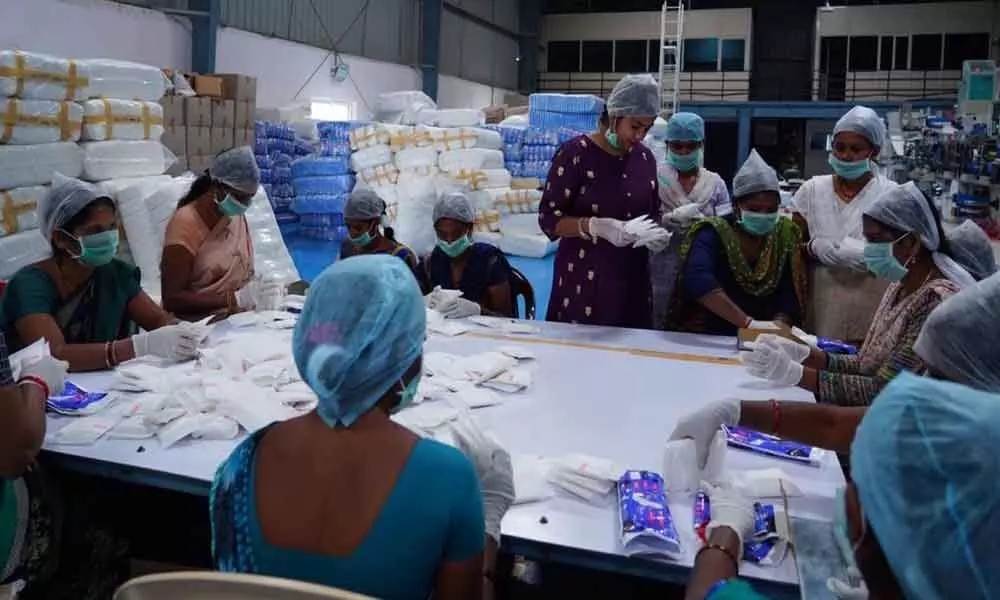Padman inspired designer empowering poor women

Ever heard of a movie inspiring someone to do something good for society? Meet Rathlawath Maheshwari, a 27-year-old, an engineer and fashion designer by profession.
Hyderabad: Ever heard of a movie inspiring someone to do something good for society? Meet Rathlawath Maheshwari, a 27-year-old, an engineer and fashion designer by profession.
Hailing from a business family, the young entrepreneur says she is so inspired by the movie 'Padman' that she set up a firm that makes eco-friendly sanitary napkins, with a view to empowering the marginalised women of Dundigal. Maheshwari who could have a comfortable job at any IT firm chose instead this well-meaning entrepreneurship. "I belong to a business family and my late father Krishna Nair was a politician and a businessman. I always preferred doing business to working as an employee."
Go-five unit was set up in March 2019 and is located near Dundigal on the outskirts of Secunderabad. It sells a packet of eight sanitary napkins for just Rs 18. Even as the market is already flooded with a range of sanitary napkins by various manufacturers, she promised herself that she would turn the tide with the organic napkins that the company makes.
The sanitary napkins that her unit manufactures are an organic cloth which is imported from Canada. The unit utilises natural additives that decompose plastic within six months of coming in contact with soil.
"Selling it at higher prices would defeat the purpose of opening the unit. Therefore, we are looking for support from government and private entities who can sponsor and enable us to supply the product to a larger crowd without jacking up the price," said Maheshwari. Maheshwari has around 30 workers who are all women, working at her manufacturing unit.
The entire process is mechanised while the women help in packing and parceling the product. The manufacturing machine is imported from China which simplifies the process of making napkins, producing around 2 lakh pieces a day. She supplies napkins to women through NGOs, in schools and colleges, at a rate as low as Rs 18 per packet.
"I approached various NGOs who were ready to help me to distribute these sanitary napkins to the women in rural areas across the state. In schools, the state agreed to sponsor only after the product was found safe after a trial. Today, many schools in Dundigal and other parts of Telangana use the napkins we manufacture. You can also find them in small shops in villages where we supply at subsidized rates for women to buy," adds Maheshwari.
The unit now sells around 15 lakh pieces of sanitary napkins a month, out of which around Rs 2 lakh is generated monthly. The salary and the other expenses are taken care of from the revenue generated.
Lack of awareness
The stigma around the entire issue of menstrual hygiene was a barrier for her before setting up the unit. Menstrual health is often ignored, especially, by the marginalised women due to lack of awareness which leads to all kinds of serious health risks.
After setting up the unit, the next task was to educate women in the slum dwellers to use napkins instead of cloth. When Maheshwari began interacting with the women on the need for menstrual hygiene, she realized that the issue here was not only about lack of awareness but also the high cost of these napkins that forced them to use unhygienic methods.
Women in the villages replied saying that they could get a kilo of any vegetables or any groceries instead of spending the money on these. "This made me think to do something for these people that would not only help them hygienically but also economically. Today these women are able to earn an amount of Rs 6,500 per month," adds Maheshwari.
She set up her industry at her own family land at Dundigal. She further adds, "The expenses were huge and I applied for a bank loan. The banks shuttled me from one place to another because for most managers, the business idea seemed like a joke. Many of them would start rolling their eyes or give casual smirks when I would tell them about sanitary napkins.
The stigma around the entire issue of menstrual hygiene was a barrier I had to wade through before setting up the unit." With keeping her property papers as a guarantee, she further got a loan of Rs 2.5 crore for the machinery and Rs 50 lakh for the raw materials.











